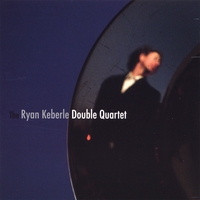Review by Brad Walseth
Trombonist Keberle hails from Spokane Washington, graduated from the Manhattan School of Music and Julliard, studied with Steve Turre and Wycliffe Gordon, and has played with Wynton Marsalis and the Lincoln Center Jazz Orchestra, Jimmy Heath, Slide Hampton, the late Percy Heath, Teo Macero, Jon Hendricks and Joe Lovano. He is a member of several large ensembles, including the Maria Schneider Jazz Orchestra aand plays regularly at some of New York�s hottest clubs, including a weekly stint with David Berger and His Sultans of Swing at Birdland. For his remarkably self-assured debut recording, Keberle has assembled a talented group of musicians to play his original compositions, as well as arrangements of songs by Wayne Shorter, Brad Mehldau, and Lennon & McCartney.
Keberle augments a rhythm section of Matt Brewer on bass, Brad Wentworth on drums and pianist Adam Birnbaum with an unusual complement of Michael Rodriguez on trumpet, Chris Komer on French horn, Mashall Gilkes on trombone and Jose Davila on tuba. The result is a very warm and overall smooth sound that is filled with engaging sonorities for the listener. Some of the writing is layered so as to nearly delve into classicism or Third Stream, but the composer thankfully keeps the music grounded from taking too airy a flight.
Throughout the entire recording, the playing is flawless and dynamic with drummer Wentworth and pianist Birnbaum especially contributing to Keberle's vision. But it is the brass that really provides the richness of timbre in their harmonies and expressive soloing. Opener, "Something Speaking" showcases this harmonic depth to its full advantage.
Keberle's original compositions like "Something Speaking," "What Goes Around"and the polyrhythmic "Organic Rodeo" are intriguing, luscious and tasteful, while his own playing is gorgeous in tone. Some other highlights include Shorter's "Children of the Night," with the talented Gilkes taking his solo turn, Keberle's lovely ballad "When I'm Away" where Birnbaum and Keberle strive for creating sheer beauty in their solos, and the almost chamber jazz version of Mehldau's "29 Palms." The Beatles covers are interesting as well and remind us of what jazz arrangers can do with strong melodic content.
Keberle and his bandmates are well-schooled in European classical music, and they emerge here with pieces that combine European classical tone poem harmonics with jazz rhythms and structures. Recommended for lovers of sophisticated and silken brass arrangements, "Double Quartet" is an impressive debut, full of shades and subtleties, from a young artist with a bright future ahead of him.
|

